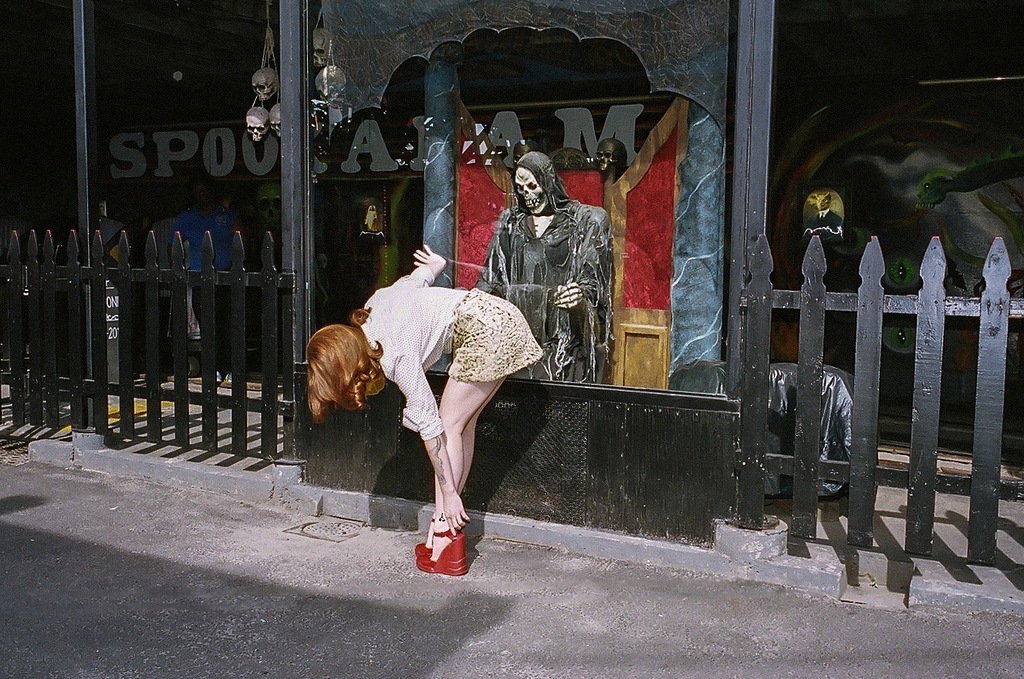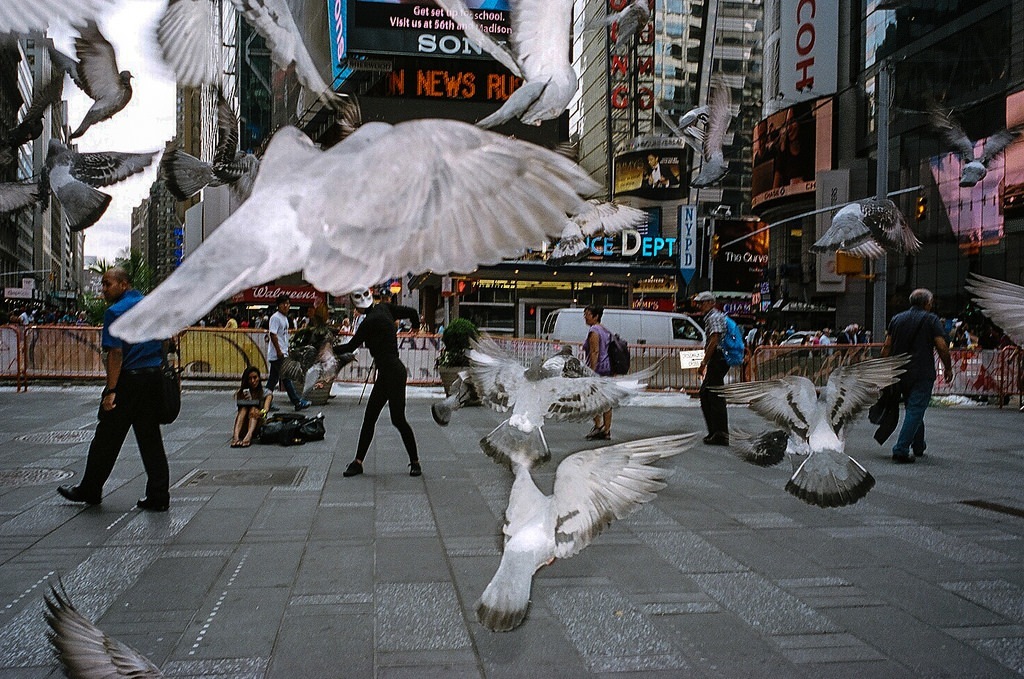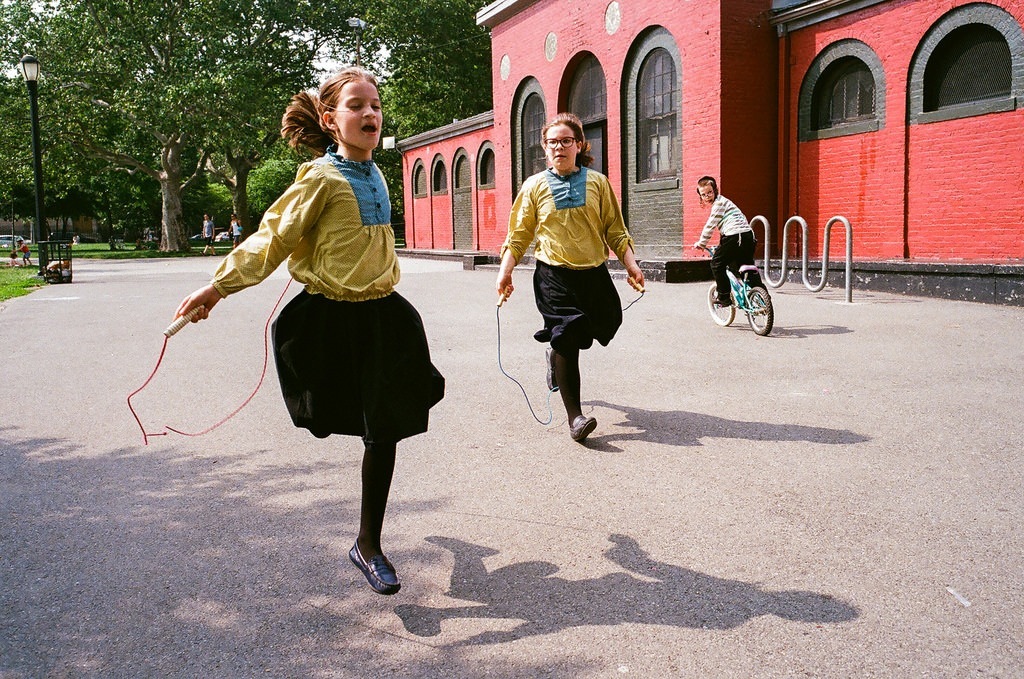By now, you’re probably familiar with Daniel Arnold‘s mythology. Since moving to New York thirteen years ago, the photographer’s honest, emotional, and voracious documentation of blink-and-you-miss moments has branded him with taglines like “the paparazzi for strangers.” And while his super successful Instagram account helped catapult him to shooting for Vogue, Arnold is so much more than the subway sleeping, selfie snapping, sidewalk brawling sum of his parts. One afternoon, we picked the photographer’s brain about celebrity, censorship, the evolution of Instagram, and why today’s young, feminist creatives are “fucking warriors.”

You’ve lived in New York for 13 years. How have you seen it change?
Everybody wants to cling to a moment in time that has certain stores, certain restaurants and certain attitudes — something that feels formative for them. But I think there’s something really nice about how quickly things change in New York. You blink and the whole location is completely gone, and the only place that it exists is in your head or in your pictures or whatever creative manifestations of it you have in your life.The New York in my head probably doesn’t exist. The New York in my head is based on visiting here when I was nine-years-old and having my rebel cousin take us to Chinatown to look at nunchucks and the sleeziness of Times Square. It was only recently that I started realizing what a big impact those childhood visits made on me and how much they are really represented in the pictures I take. It’s evolved beyond this, but a big starting impulse was to find evidence of what was left of imaginary New York — the spaces where reality lines up with my perception.

You shot the Met Ball for Vogue, which seemed like the complete opposite of what you normally capture. What was that experience like compared to shooting on the street?
The idea of me being a street photographer is technically justifiable, but it’s more circumstantial than definitive. What I am is just a junkie. I want a new picture to feel proud of every day. It just happens that the greatest, un-depletable, constantly interesting resource that I have right outside my door every day is a street. I am so excited to be in any room where I don’t belong, to go anywhere where I feel like I am on a new planet and have to figure out the rules and break them. So the Met Ball was a fucking dream — I’d take the Met Ball over the street any day. There was a point where I stood invisibly in a river of 700 celebrities as they passed over me like a pebble.
I felt one hundred percent like those were my pictures, but I felt this really physical pressure like I never have before. Like I had this crazy opportunity and I had to shoot everybody or I’m never going to see them again. But I never thought I was capable of the level of shamelessness and audacity that came to me that day. I couldn’t tell you who that person was, crouching in a corner of a dining hall between Madonna and J. Lo, looking up Rihanna’s nose. Thirteen years of living in New York has given me this feeling of license to push until someone tells me to stop — to walk into every door that opens until someone tells me to get out.
You were banned from Instagram back in 2012 for posting a topless photo. Three years later, body policing and online censorship have really been brought to the fore. How do you see it?
Freethenipple is not a big personal issue to me because people don’t need to be naked for my purposes at all, but I think it’s a really, really interesting thing. For one, to try to outlaw nudity on the internet is just insane — it’s like no sand at the beach. Porn has done more to advance technology than space travel. But more than I have an issue with censorship, which is a stupid holdover from a previous time that probably won’t last, I feel the resistance to it lately — the way that women are taking that power back — is amazing to watch. The fight against censorship is changing things in a really interesting way for women. What Ally Marzella, India Salvor Menuez, and this whole crew of girls are doing with their sexuality is so powerful, interesting, and so beyond sex. After a long life of “let me die when I’m 25, let a piano fall on me, let me get hit by a truck,” now it’s like ‘let me be 300!’ I want to see how this shit turns out.
It’s interesting to see how specific we’ve become about documenting the world. I interviewed another photographer with an Instagram account dedicated to neon signs.
That’s a very applicable, concrete analogy for the same thing I do. Once we start thinking about something, there it is, everywhere. Which — combined with the pace and the appetite of Instagram — makes a total addict of everyone. I’ve made a lot of really interesting friends from previous generations of the photo world, and I have been cautioned to monitor my pace. While I have contained myself a bit, I think there’s something really valuable in the fact that we have this mainstream platform that demands constant attention. It’s encouraged the formation of language. There are all these weird new phrases: neon signs, license plates, basketball hoops. Instagram reveals and motivates its own process–you see how things evolve.
In the forward to The Ballad of Sexual Dependency, Nan Goldin writes about sometimes wishing the camera wasn’t an apparatus — that she could just blink and save the moment. Do you ever feel that way?
When I walked into this park today, two Hasidic girls, sisters, in the exact same green shirt and black skirt, frilly socks and black shoes were sprinting towards me with matching jump ropes, running their asses off. I got that photo, but it’s interesting you say that. It’s so rare that I look through the viewfinder — I never do. I shoot from the waist, I shoot emotionally, half the time I fuck up, but there’s no time to compose. That’s not how the world is. Things — the good things — don’t last at all.
Credits
Text Emily Manning
Photography Daniel Arnold
